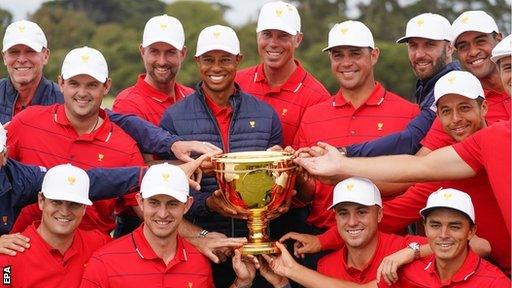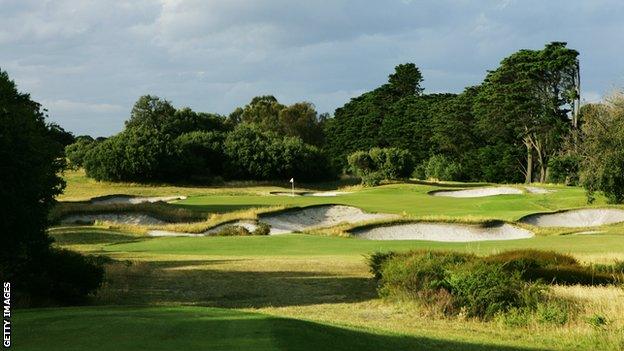Tiger Woods: Presidents Cup performance adds further to his legend
- Published

Woods won all three of his matches at Royal Melbourne this week
Tiger Woods added another significant line to his legend with his triumphant playing captaincy of the United States at the Presidents Cup.
The skipper inspired America's comeback on the final day to condemn Ernie Els' international team to an eighth successive defeat. In the process, Woods started to provide answers to one of the biggest questions that has hovered over his playing career.
Despite his individual glories - including 15 major titles - the reigning Masters champion has never been seen as a team man. His Ryder Cup record is pretty woeful with only 13 wins from 37 contests.
Woods has only once been on the winning side, back in 1999 when he played his first home match in the infamous 'Battle of Brookline'. Such a potentially talismanic figure has inhibited rather than inspired playing partners, while bringing the best out of opponents.
That said, the 43-year-old has tended to look more comfortable in Presidents Cup matches where the intensity often pales in comparison with matches when Europe are the opposition.
But this one had an edge. There was a Patrick Reed inspired hostile build up and Els desperately wanted to put one over his old rival.
Yet Woods was a man possessed. He won all three of his matches at Royal Melbourne to become his country's most successful player in the Presidents Cup.
It is easy for those of us this side of the pond to dismiss this biennial contest. It does not share the same level of history but it is undoubtedly growing in passion with each match that passes.
Results have been terribly one sided in America's favour, but at Royal Melbourne they were given a real fright by an astutely managed international team.
And Woods rose above it all. He was a master at work on a masterpiece of a golf course
This was the big take away. How great it was to see such a team competition on such a great course, because golf architecture does not get better than Royal Melbourne.
Its fast, firm conditioning and the tactical questions it poses invariably identify the best player. No one was better than Woods in last week's match.

Woods was in commanding form around the superb Royal Melbourne course
Truly flawless golf has never been played, that's an impossibility, but Woods came close to perfection with the craftsmanship he use to take on Dr Alister Mackenzie's glorious design.
Even though the layout was put together with longer clubs to greens in mind than those that are required in the modern day, it still demanded imagination, touch and feel as well as the inevitable power that is the bedrock of distance from the tee.
Woods, who turns 44 at the end of this month, had it all. While the rest of his team struggled in largely unfamiliar playing conditions, the US captain was unbeatable alongside Justin Thomas in the foursome and four balls of Thursday and Friday.
It was a brave but probably wise call to bench himself for both Saturday sessions while the home team assembled a two point advantage to take into the closing singles.
Woods, though, loves to put himself centre of attention and as skipper he could do exactly that. America's first playing captain for 25 years sent himself out first to set the tone for the final day.
And it provided a big message that might be felt beyond the confines of this match. Only once has Woods gone out first in Ryder Cup singles, back in 2004, and often he has been held back so far in the order he has been unable to influence the outcome.
It will be no surprise, form and fitness permitting, to see him out first at Whistling Straits next year. Ryder Cup skipper Steve Stricker was an assistant in Australia and will have seen close hand how Woods likes to work in a team scenario.
Last Sunday he was brilliant in beating the Mexican Abraham Ancer, who was one of the stars of Els' plucky international line-up. Woods was never behind in that 3&2 victory, a perfect lead off performance.
It inspired Dustin Johnson and Reed to post the wins that took the US ahead for the first time in the match. There followed victories for Patrick Cantlay, Xander Schauffele and Webb Simpson, which helped their country to a 16-14 win.
"We are very inspired to play for Tiger, with Tiger, and it's so satisfying to win this cup because of that," said Tony Finau, who came from four down to halve with Hideki Matsuyama.
"I think we all believe in each other and we were able to get the job done for our captain."
Woods' smile said it all. He had led a comeback victory despite the rumpus surrounding Reed, which was prompted by the cheating allegations that followed him from the Bahamas the previous week.
Reed received plenty of taunts and injudiciously played up to them, miming digging actions to wind up the Aussie fans. It spilled over on Saturday when his caddie Kessler Karrain pushed over a spectator and was thrown out of the match.
These sort of incidents can derail a team, but they did not on this occasion. Meanwhile, it seems Reed is becoming the ultimate individual because, like at the last Ryder Cup, he failed to yield a point from foursomes or four ball play.
'Captain America', as they called him, seems only able to post points when he is playing on his own.
This will surely be noted by Stricker if he has to weigh up whether to select the controversial former Masters champion as a wildcard for next year's Ryder Cup.
We can already be sure that Stricker has taken heed of how much playing a leading role for his country now means to Woods. It is valuable information that might make him the first skipper to genuinely get the best out of him in a Ryder Cup.
"I love seeing other people cry, especially Tiger Woods," Stricker said. "Tiger did an unbelievable job. It was a privilege. And we'll keep this on the forefront of our minds forever."
